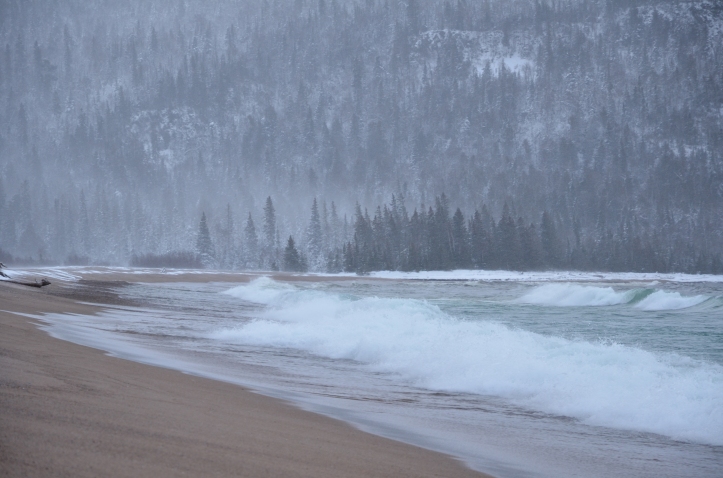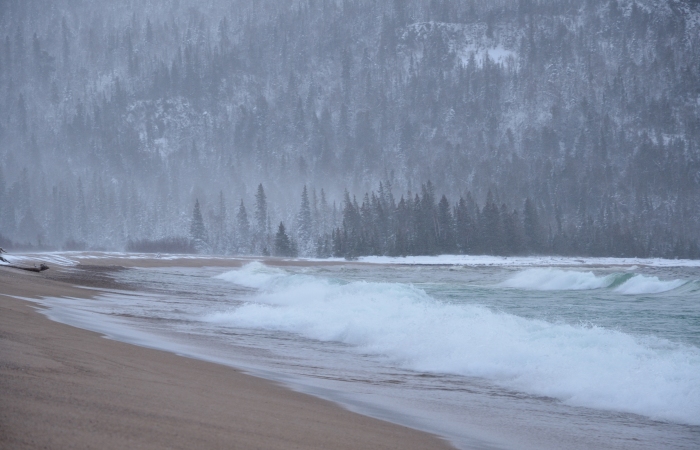
The question “Is environmental stewardship a French Canadian or French Metis cultural value?” was presented to several people beginning last October. I am happy to present the following three short essays that answer the question in different ways. This topic came to mind while considering the many challenges that face the environment throughout the historic French Canadian and Metis settlement areas, particularly in the Great Lakes region.
Many communities in the Great Lakes today were founded during the fur trade, an industry and way of life which necessitated a healthy ecosystem. Likewise, many of those same communities today depend on commercial and sport fishing, hunting, and other outdoor recreation in addition to the preservation of our historical legacy for their well-being.
What is your view? Please add your own thoughts in the comments section below and take part in the conversation. —ed.
Greg Newman — Ethical Coexistence with Nature
Hunting and gathering is part of my DNA and heritage — I feel it in my soul. It is part of my being. When I’m out in the woods I feel at ease, relaxed. It is a comfort that is hard to explain to someone who does not hunt or gather. It is what I call my meditation time; there is nothing better than chasing your quarry and being one with Mother Earth.
Hunting and gathering is a lot different today than when my forefathers were here. They thought there was an endless amount of game and trees, but as we know they were wrong. Today we do not have the open land that they had so we have to make adjustments as to how and when we hunt or gather so we do not deplete our resources.
Today you should hunt with ethics and respect. To me the ethics of hunting and gathering are: shoot or harvest only what you can consume in a given time, don’t shoot an animal and let it waste, don’t pick plants that you wont use right away, do not over-harvest, leave some for others or for seed. And last but not least when you harvest a creature or plant from nature say a prayer and help their spirit travel on.
An ethical hunter is a true steward of the land. They are vital in helping teach the younger generations how to protect the wildlife and the land. They teach the youth and the novice hunter on how to hunt safely. They can help the owners of the land that they gather from learn how to preserve the habitat for wildlife.
Donate some of your time to the landowner by fixing fences or tearing up evasive plants – things that will benefit us all. Like everybody says “save the habitat, save the wildlife.” Not only hunters and gatherers can do this – everybody who likes wildlife or enjoys the outdoors can do this. When you take care of the habitat, all species will flourish, including us!
Next time you are out for a walk in the woods pull up a seat next to a big oak or a maple tree close your eyes open your ears and listen. After a few minutes you will start hearing things you have never heard before. Open your eyes and Mother Nature will show you things you have never seen before. Only then will you truly become one with Mother Earth.
Greg Newman is a Métis/French Canadian hunter and gatherer who lives in Mounds View, Minnesota.
*
Chelsea Mongeau — The Value of Asking “Why?”
During my junior year of college, I wrote for Great Lakes Echo, an environmental news outlet. My editor David Poulson had a passion for the Great Lakes region that ran deep. From new regulations to an increase in waterfowl hunting, no story was too large or small. He taught me that asking “Why?” isn’t simply an option, but the most dangerous and powerful tool reporters have at their disposal. Echo’s audience ranges from hunters to scientists to people who just love nature. Without them driving us to ask why, we risk contributing to the damage in the areas around our lakes because there wasn’t a resounding force to hold responsible persons accountable.
In our world today cataclysmic doomsday headlines about global warming and ocean acidification dominate. It’s easy to forget that there is great value in taking part in preserving our environment, from our own neighborhoods to the entire Great Lakes Basin, from Chicago to the beautiful province of Quebec to Lake Nipigon and the western tip of Lake Superior.
By questioning environmental practices, we can do our part saving the marine and terrestrial ecologies that are essential to the economy and our health. Protecting the land that represents French Canadian heritage is one of the most extensive things an individual can do to remain proactive in saving the organisms we live with symbiotically. In so doing we also protect the cultural traditions of our forebears. And for myself as a journalist, it all begins with asking ‘why?’
Chelsea Mongeau is a freelance journalist and Environmental Biology student at Michigan State University.
*
Sebastien Malette — Metis: Connected to the Land?
The historical weaving of the Metis People came out of various kinship alliances between First Nations, European voyageurs and the Land itself. Travelling its many rivers, Voyageur Metis mixed their sweat, hopes and tears with the many waters cross-running the shell of Turtle Island.
At different crossroads, various mixed communities exhibiting hybrid cultural features emerged. Their descendants are now the fire keepers of one of the oldest and sacred traditions, their mixed-flesh and memories offering living testimonies of primordial alliances that made possible the coming of a new People.
As with most Aboriginal cultures, the worldview of the Metis People is intrinsically connected with the wellbeing of the Land. Here the relationship is not merely instrumental, materialist or extractivist; it is rather based on a profound spiritual connection. As a person of Metis heritage myself, I was taught to view the Land as sacred. I was encouraged to take only what is needed with reverence and gratefulness. I learned that my fate is intrinsically connected to its Spirit and all its relations.
Of course, as Western colonialism became rampant, the relationship between Metis People and the Land also evolved into a very specific political one. We have to know that Metis communities inhabited and harvested many parts of North America well before the so-called Effective Control of colonial authorities.
Many ordeals followed their attempts to assimilate the Metis, including dispossession, repression and institutionalized discrimination targeting Metis ethnic mixedness and cultural differences. As a famous example, the Metis of the Western Prairies fought valiantly against the expansionist policies of the Canadian government. Following the footsteps of their Prairies cousins, many Metis communities from Atlantic to Western Canada are now engaging in various juridical and political battles to protect the relationship they have with their traditional territories.
Hence, to the question that asks: is there a special connection between French Canadian and Metis cultures and the Land? I answer that our identity is profoundly infused with a love for the Land; not merely as an inanimate object, but rather as the sum of all living and interconnected relationships that sustain the circle of Life in its various manifestations.
Sebastien Malette (PhD University of Victoria) is of mixed-heritage Métis/Québécois. He teaches at Kiuna College near Montreal and is Chairman of Communities of the Voyageur Metis.



James my hat is off to you!!! they were beutiful, brought tears to my eyes.
LikeLike
Reblogged this on The Red Cedar and commented:
Occasionally I re-blog to The Red Cedar a piece from Voyageur Heritage (https://voyageurheritage.wordpress.com/) the community blog I edit. Enjoy the fine writing of these interesting pieces contributed on the theme of the environment and cultural values.
LikeLike
Our culture itself rises from the land on which we live, the environment is inextricably tied to our F/C identity. The food we eat is based on the animals and plants here. Our clothing was designed for these particular weather conditions and our activities out in the elements. The sash, the muskrat stew, the birch bark canoes – these define our culture and are gifts from the earth. If you put a voyaguer in the desert, how long would he survive? We are tied to THIS land, these lakes, these woodlands. Without them, we are just a part of the electronic mainstream. If you pull the plug, they have no culture at all. The challenge for us is to maintain our F/C culture, and thus maintain the land which sustains it.
LikeLike
A thought-provoking comment Dar – you express something that I think many people feel but don’t articulate: how lifestyle is bound up with our environment, history, and culture. Urbanization has had its effect on all cultures, but not in the same ways. When French Canadians from the Great Lakes find themselves displaced from rural areas and small towns into major urban areas, what happens to the culture? Detroit was still a fairly small town when historical events pushed them to the margins. I am searching for ways to help our community have a sense of continuity in modern life. How do we make sure that this socio-cultural-ecological culture remains ‘rooted.’ How do online communities foster that?
LikeLike
As I learn about my ancestors, my mind is in the past. Like a good book, it stays with me and I imagine myself a character in the story. How can we bring the past into the present world? What elements are still alive today? This online community is a lifeline to our lost heritage, a golden thread that can lead us back to a more authentic relationship to the environment and one another. We can see ourselves in a new way, and see our reflection in one another. As I read the posts and do my own research, this new culture is taking root inside of me. Culture is a collective way of thinking, so we feed the mind with information. As we make connections to one another, we build community.
As a metaphor, imagine that we wanted to restore the beaver population of the Great Lakes. We might start with the two little beavers in the zoo, develop a breeding program and reintroduce them to the wild. But they would have to learn everything, how to find food, raise their young, etc. So if we introduce them to the remaining wild beavers, they can observe, become part of their community — learn the beaver culture. We are like this too–some of us are from the zoo, some are wild, some are in between. Heartfelt thanks to all the wild ones for showing us the way, for inviting us to your party, for your dedication and persistence.
F/C culture is taking root within ourselves and growing every day. To encourage its growth, we need to experience the culture, become a part of it, share it with others, engage the senses–smell the fire, taste the food, hear the music . . . and dance!
LikeLike